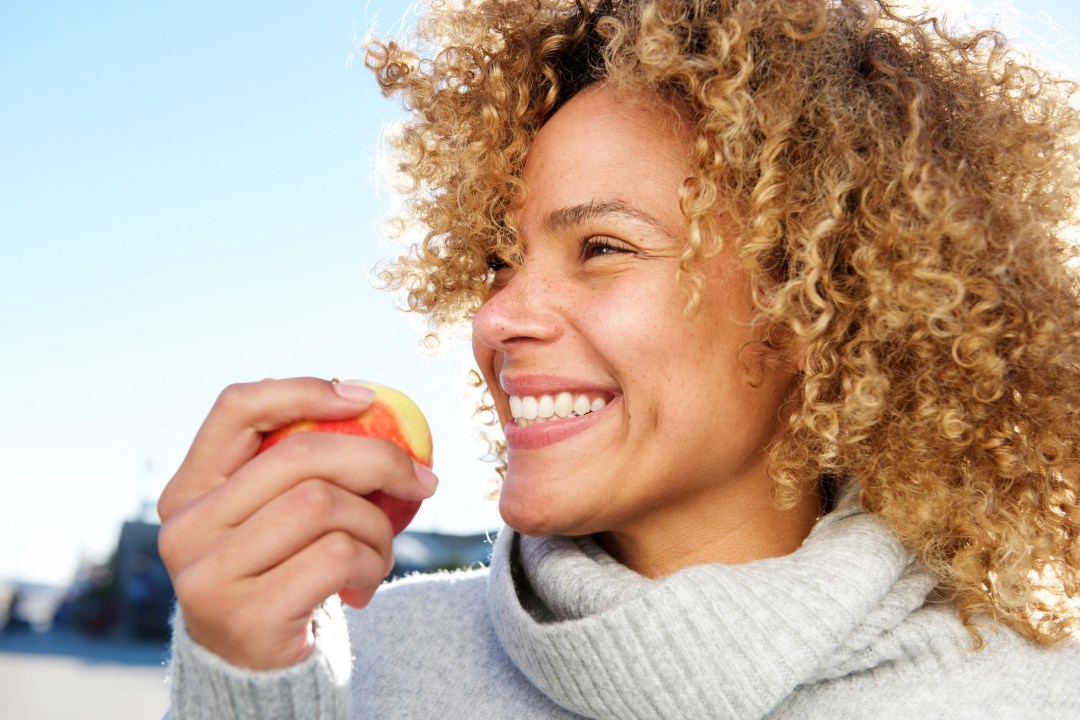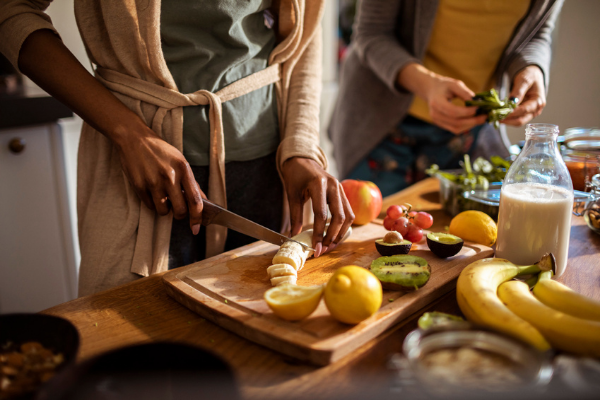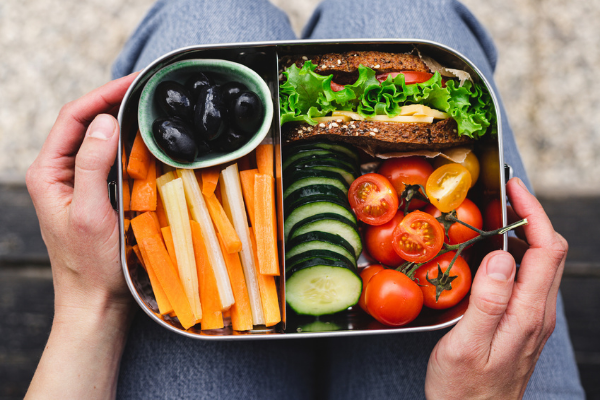The happiness diet: Eat your 5-a-day for a sunnier outlook
It's a breakthrough that's been described as 'gold dust' by scientists: a study has revealed the foods that help you glow with good health and vitality, also make you joyful!

Are you hoping to make 2022 the year that you truly feel better in body, mind and soul? The chances are that you probably don’t need us to tell you that piling your plate with fruit and vegetables and getting regular exercise will improve your wellbeing; supporting your sleep, making your skin brighter and helping your favourite skirt feel less snug.
However, while it’s easier to eat well in summer, if you’re not feeling your best and brightest on colder, darker January days, we know very well that it can feel like a challenge to reach for the fruit bowl instead of the biscuit tin – there’s a reason they call sweet sticky puddings and chocolate bars comfort foods, after all!
But now we can share exciting evidence that might make you look differently at that plate of salad or steaming bowl of soup, because findings show they may actually be the best way to make you feel not just healthier, but happier.
What the science says
For a long time we’ve been advised to increase our intake of fruit and vegetables and get more exercise. It’s good for our heart, our gut and – as we’ve been told more recently – our brain. Multiple studies have revealed that people who eat more fruit and veg are often more content. But these studies rarely tell us why, and it’s long been assumed that people who eat more fresh foods are probably higher up the social ladder, better off financially and more educated and, in fact, it’s these factors, rather than what they put on their plate, that leads to increased happiness.
But now research jointly conducted by the University of Kent and the University of Reading, which looked at data from a long-term survey of thousands of Britons, has proven that it’s the eating of the fruit and vegetables and the exercise that have a physical impact on happiness levels, and not the societal conditions that lead to making these lifestyle choices. It’s a step-change in what we’ve always been led to believe, so let’s say that again: eating fruit and vegetables and exercising are the things that make you happier – and there are no strings attached!

‘In economics, it’s important to establish cause and link, not just correlation,’ says Adelina Gschwandtner from the University of Kent’s School of Economics. ‘There are lots of studies already showing correlation, but finding a causation is much harder,’ she adds.
The research was conducted using a framework that tries to find a link between healthy lifestyle behaviour and happiness to show that they aren’t just connected, but that one causes the other. Finding this link was like ‘a search for gold dust’ says Dr Gschwandtner.
But, after seven years, it’s a search that have proven, er, fruitful. ‘We were able to establish a causal link between a healthy lifestyle and happiness, not the other way around,’ Dr Gschwandtner clarifies. ‘If people get the message that healthy behaviour will improve happiness, this is a stronger motivator in encouraging people to take them up.’ After all, who can argue with a lifestyle change that promises to make you happier?
Read on to discover some simple switches and handy hacks to help you embrace this groundbreaking advice and make 2022 the year you really do feel happier, as well as healthier…
Blossom with plants
Count your colours: ‘Concentrate not just on getting your five-a-day but on how many colours you are having,’ says Pete Williams, a functional medicine practitioner. ‘Try sticking an A4 rainbow colour sheet on your fridge so you can tick off how many colours you have had in the day,’ he suggests. Not only will this system encourage you to increase your intake, but variety is also important when it comes to good gut health. Research indicates that a diet consisting of different food types can lead to a more diverse microbiome, which in turn results in a healthier gut.
Say bye-bye to beige: We’re not obsessing with colour or anything, but if your plate is looking too, well, beige, shake it up. Traditional carbs, such as pasta, rice, bread and potatoes, are all very well, but you can easily up your veg intake – and increase your meal’s nutritional punch – by switching your boring beige staples for a veggie alternative. Try a side of roasted Mediterranean veg to go with your roast chicken instead of your usual jacket spud. Or why not try courgette, beetroot or sweet potato noodles (either home-made with a spiraliser or from the supermarket) to give your bolognese a boost. Try using aubergine sheets or leek slices instead of layers of pasta in a lasagne, or roast cauliflower to make a delicious side for your curry. You’ll never want plain old boiled rice again!
Spice it up: Don’t forget your store cupboard; herbs and spices are a particularly effective way of getting your plant food numbers up. ‘Pound for pound, herbs and spices contain some of the most powerful and helpful compounds to humans,’ Williams explains. ‘For example, cardamom not only reduces blood pressure and lowers the risk of heart disease, it also helps with reducing depression and anxiety,’ he adds. Add a little to your cauliflower (above) to maximise your nutrition.

Rethink animal products: A vegan diet is one of the best ways to increase your fruit and veg intake. But if this isn’t for you just yet, reducing your meat and fish consumption for part of the time still helps, and it’s also an exercise in being more creative and inspiring you to mix up your go-to meals. Start with one or two days a week – for example, the classic meat-free Monday – and move up to more days as you build confidence in the kitchen. And on nights you’re still eating meat, try the new ‘meat and veg’ options available from many of the supermarkets. Meals such as mince with butternut squash or sausages packed with butter beans and onions mean you’re increasing your vegetable (and reducing your meat) intake with miniumum effort.
Batch-cook: Meal prep is an excellent way to save time, stop food waste and ensure you always have something nutritious on standby. And packing freezable meals with fruit and veg is an excellent way to ensure you hit those targets. Cook a big pot of veggie-packed curry, soup or stew for cold winter nights, or make a batch of tomato pasta sauce with peppers, carrots, leek and celery for a speedy midweek dinner. Stew fruits such as apple, pear or winter berries to top porridge or yoghurt, or have as a warming mid-afternoon snack.
Euphoric movement
Exercise incidentally: Incidental exercise means moving whenever you get the opportunity. ‘No special clothes or equipment are required. Simply put a reminder in your phone to move at least once every hour,’ says David Wiener, a training specialist for the fitness app Freeletics. This could be running up the stairs, mopping the kitchen or playing with your kids. If you’re still working from home, make the most of the multitasking opportunities. You can take calls while walking around to raise your step count, or sit on an exercise ball as you work at your laptop. ‘Use the ball to perform some quick exercises throughout the day – search online for how to do seated marches or stability ball wall climbers, which can easily help you work up a sweat,’ Wiener adds.
Get your groove on: Music is a powerful mood booster and mode of encouragement to get you moving. One study found that music can increase endurance during a workout by up to 15 per cent.* ‘Upbeat, fast-paced music and songs with inspiring lyrics can help motivate you. Frequently updating your playlist and adding new songs can also help,’ Weiner recommends. Even putting on your kit can drastically change your motivation, mindset and mood. If you’re tempted to miss a workout, pack your gym bag the night before or, if possible, put your gym clothes on first thing. If you look and feel the part, there’s less reason not to exercise.

Be accountable: Find a friend to exercise with and you’re less likely to flake. Research indicates that having a specific accountability partner increases your chance of success to 95 per cent.** Combining socialising with exercising is also a great way to tick two boxes: seeing friends and staying healthy. If you prefer to work out alone, try signing up for specific classes in advance. You’re more likely to attend something you’ve officially scheduled in your calendar. In the longer term, signing up to events – whether it’s a half-marathon, an organised walk or a tennis tournament – is likely to encourage you to stick to your regime.
Go outside: While it might be harder to leave the comfort of the warm sofa in the winter months, it’s more than worth the effort. Exercising outdoors is a double win when it comes to happiness. It has been has proven that regular physical activity outdoors leads to greater long-term happiness compared to working out inside. Remember the old adage: there’s no such thing as bad weather, only unsuitable clothing. Wrap up warm and take your walk, jog or cycle in the park, brave the heated lido or join a game of outdoor sport.
HIIT it: With workouts ranging from 10-30 minutes, High-Intensity Interval Training, known most commonly as HIIT, is one of the easiest ways to schedule exercise when you’re short on time. The concept is simple: intense bursts of exercise followed by short, sometimes active, recovery periods. The intense nature of the workout means you burn high levels of calories both while you’re working out and, more importantly, in the hours afterwards.
*Pubmed.ncbi.nlm.nih.gov/19325186; **The American Society of Training and Development
Words: Elizabeth Bennett
Photographs: Getty Images









